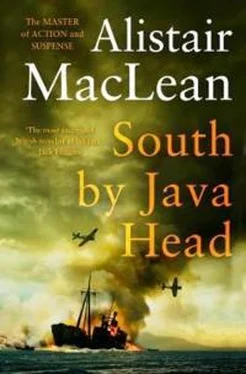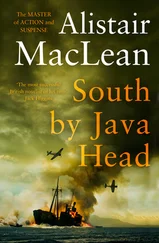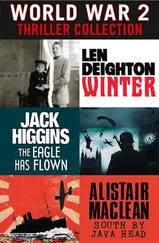“Any more suggestions are superfluous. Do you expect me to remain in this damned boat all night?” Nicolson swung round as the deep, irate voice boomed out behind him. He swung round to see Farnholme standing upright, one hand grasping the handle of the heavy Gladstone bag.
“What – what are you doing?” Nicolson demanded.
Farnholme looked at him, but said nothing. Instead he smiled, the curve of the upper lip below the white moustache a masterpiece of slow contempt, looked up at the officer standing above them and jerked a thumb in Nicolson’s direction.
“If this fool attempts to do anything silly or restrain me in any way, shoot him down.”
Nicolson stared at him in sheer incredulity, then glanced up at the Japanese officer. No incredulity there, no surprise even, just a grin of satisfaction. He started to speak rapidly in some language quite unintelligible to Nicolson, and Farnholme answered him, readily and fluently, in the same tongue. And then, before Nicolson had quite realised what was happening, Farnholme had thrust a hand into his bag, brought out a gun and was making for the side of the boat, bag in one hand, gun in the other.
“This gentleman said we were welcome.” Farnholme smiled down at Nicolson. “I fear that he referred only to myself. A welcome and, as you can see, honoured guest.” He turned to the Japanese. “You have done splendidly. Your reward shall be great.” Then he broke once more into the foreign language – Japanese, it must be, Nicolson was sure – and the conversation lasted for almost two minutes. Once more he looked down at Nicolson. The first heavy drops of the next rain-squall were beginning to patter on the decks of the M.T.B.
“My friend here suggests that you come aboard as prisoners. However, I have convinced him that you are too dangerous and that you should be shot out of hand. We are going below to consider in comfort the exact methods of your disposal.” He turned to the Japanese. “Tie their boat aft. They are desperate men – it is most inadvisable to have them alongside. Come, my friend, let us go below. But one moment – I forget my manners. The departing guest must thank his hosts.” He bowed ironically. “Captain Findhorn, Mr. Nicolson, my compliments. Thank you for the lift. Thank you for your courtesy and skill in rendezvousing so accurately with my very good friends.”
“You damned traitor!” Nicolson spoke with slow savagery.
“There speaks the youthful voice of unthinking nationalism.” Farnholme shook his head sadly. “It’s a harsh and cruel world, my boy. One has to earn a living somehow.” He waved a negligent, mocking hand. “ Au revoir . It’s been very pleasant.”
A moment later he was lost to sight and the rain swept down in blinding sheets.
FOR WHAT seemed a long time no one in the lifeboat spoke or moved, except to ride with the slight rolling of the boat: oblivious of the cold driving rain they just stared blankly, stupidly, at the spot where Farnholme had been standing before he had disappeared.
It probably wasn’t a long time, it just seemed that way, it was probably only a matter of seconds before Nicolson heard Miss Plenderleith call him by name and say something. But in the swish of the heavy rain in the sea and frenetic drumming on the torpedo boat’s deck, her voice was only a meaningless murmur.
He turned and stooped, the better to hear, and even in that moment of shock her appearance caught and held his attention. She was sitting on the port side bench, her back as straight as a wand, her hands clasped primly in her lap, her face quiet and composed. She might have been sitting in her drawing-room at home, but for one thing: her eyes were flooded with tears and, even as he watched, two large drops trickled slowly down the lined cheeks and fell on to her hands.
“What’s the matter, Miss Plenderleith?” Nicolson asked gently. “What is it?”
“Take the boat farther back,” she said. Her eyes stared sightlessly ahead, and she gave no signs of seeing him. “He told you. Farther back, at once.”
“I don’t understand.” Nicolson shook his head. “Why do you want us–”
He broke off abruptly as something hard and cold struck painfully at the back of his neck. He whirled round and stared up at the Japanese who had just prodded him with the barrel of his machine-gun, at the smooth, yellow face shining in the rain.
“No speaking, Englishman.” His English was far poorer than his officer’s. He looked dangerous, the kind of man who might welcome the opportunity to use the gently waving gun in his hand. “No speaking, anyone. I do not trust you. I will kill.”
“You heard what I said.” Miss Plenderleith’s voice was firm and clear, without the vestige of a tremor. “Please.”
The sailor moved his gun till it was lined up on Miss Plenderleith’s head, and dozen pairs of eyes watched as the knuckles of his right index finger whitened under the pull. His lips were drawn back in an evil smile and Nicolson knew that the Japanese – many of them, at least – required far less provocation to kill. But Miss Plenderleith just stared up at him with an expressionless face – almost certainly she wasn’t seeing him anyway – and he suddenly lowered the gun with some angry exclamation and took a pace backwards. He jerked his head at the other armed sailor – the officer had taken the third with him when he had gone below – and gestured that the rope made fast to the lifeboat’s bow should be brought farther aft. Nicolson and McKinnon paid the lifeboat along the torpedo boat’s side, and very soon they were streaming off its stern at the end of a couple of fathoms of rope. The two sailors stood side by side on the poop of the torpedo boat, side by side, cocked carbines ready in their hands. Their eyes searched the lifeboat hungrily, searched for the slightest movement, for anything at all that would give them an excuse to use their guns.
The torpedo boat was moving again, engines throttled back to dead slow but still enough to send it cutting through the water at three or four knots. It headed north-east, into the sea and the heavy rain, rain so heavy that, from the lifeboat, the bows of the torpedo boat were almost lost in the mirk and the gloom. The lifeboat itself was beginning to pitch at the end of the tautened rope, but not heavily.
Miss Plenderleith had her back to the rain and the guards. Perhaps there were still tears on her cheeks, it was difficult to say – the heavy rain was soaking through the straw brim of her hat, and all her face was wet. But her eyes were clearer now, and they were looking straight at Nicolson. He caught her glance, saw her drop it to the carbine lying by her side where Farnholme had left it, saw her raise her eyes to his again.
“Don’t look at me,” she murmured. “Pay no attention to me. Can they hear me?”
Nicolson stared ahead at the guards, his face bleak. The tiny shake of his head must have been imperceptible to them.
“Can you see the gun? Behind my bag?”
Nicolson looked idly at the bench where Miss Plenderleith was sitting and looked away again. Behind the canvas and leather bag where Miss Plenderleith kept her knitting and all her worldly possessions he could see the heel of the butt of the carbine. Farnholme’s gun, the carbine he had used so effectively against–
–Suddenly there flooded into Nicolson’s mind the recollection of all the times the brigadier had used that gun, of the damage he’d done with it, how he’d blown up the big gun on the submarine, how he’d beaten off the attack by the Zero that had attacked the lifeboat, how he’d saved his, Nicolson’s life on the beach of that little island, and all at once he knew that there was something fantastically wrong with this desertion and betrayal, that no man could so wholly alter–
Читать дальше
Конец ознакомительного отрывка
Купить книгу










